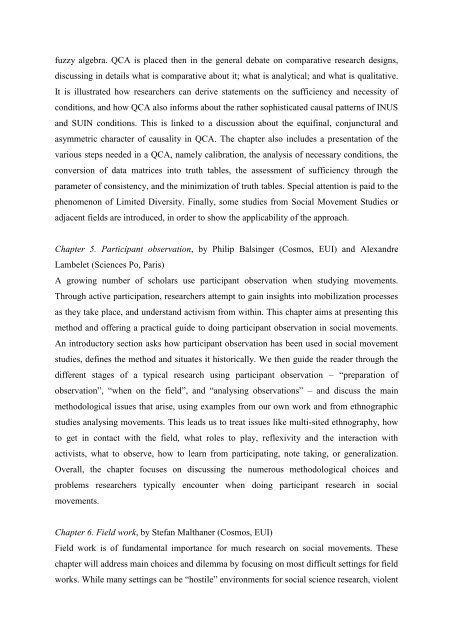Methodological Practices in Social Movements Research
Methodological Practices in Social Movements Research
Methodological Practices in Social Movements Research
Create successful ePaper yourself
Turn your PDF publications into a flip-book with our unique Google optimized e-Paper software.
fuzzy algebra. QCA is placed then <strong>in</strong> the general debate on comparative research designs,<br />
discuss<strong>in</strong>g <strong>in</strong> details what is comparative about it; what is analytical; and what is qualitative.<br />
It is illustrated how researchers can derive statements on the sufficiency and necessity of<br />
conditions, and how QCA also <strong>in</strong>forms about the rather sophisticated causal patterns of INUS<br />
and SUIN conditions. This is l<strong>in</strong>ked to a discussion about the equif<strong>in</strong>al, conjunctural and<br />
asymmetric character of causality <strong>in</strong> QCA. The chapter also <strong>in</strong>cludes a presentation of the<br />
various steps needed <strong>in</strong> a QCA, namely calibration, the analysis of necessary conditions, the<br />
conversion of data matrices <strong>in</strong>to truth tables, the assessment of sufficiency through the<br />
parameter of consistency, and the m<strong>in</strong>imization of truth tables. Special attention is paid to the<br />
phenomenon of Limited Diversity. F<strong>in</strong>ally, some studies from <strong>Social</strong> Movement Studies or<br />
adjacent fields are <strong>in</strong>troduced, <strong>in</strong> order to show the applicability of the approach.<br />
Chapter 5. Participant observation, by Philip Bals<strong>in</strong>ger (Cosmos, EUI) and Alexandre<br />
Lambelet (Sciences Po, Paris)<br />
A grow<strong>in</strong>g number of scholars use participant observation when study<strong>in</strong>g movements.<br />
Through active participation, researchers attempt to ga<strong>in</strong> <strong>in</strong>sights <strong>in</strong>to mobilization processes<br />
as they take place, and understand activism from with<strong>in</strong>. This chapter aims at present<strong>in</strong>g this<br />
method and offer<strong>in</strong>g a practical guide to do<strong>in</strong>g participant observation <strong>in</strong> social movements.<br />
An <strong>in</strong>troductory section asks how participant observation has been used <strong>in</strong> social movement<br />
studies, def<strong>in</strong>es the method and situates it historically. We then guide the reader through the<br />
different stages of a typical research us<strong>in</strong>g participant observation – “preparation of<br />
observation”, “when on the field”, and “analys<strong>in</strong>g observations” – and discuss the ma<strong>in</strong><br />
methodological issues that arise, us<strong>in</strong>g examples from our own work and from ethnographic<br />
studies analys<strong>in</strong>g movements. This leads us to treat issues like multi-sited ethnography, how<br />
to get <strong>in</strong> contact with the field, what roles to play, reflexivity and the <strong>in</strong>teraction with<br />
activists, what to observe, how to learn from participat<strong>in</strong>g, note tak<strong>in</strong>g, or generalization.<br />
Overall, the chapter focuses on discuss<strong>in</strong>g the numerous methodological choices and<br />
problems researchers typically encounter when do<strong>in</strong>g participant research <strong>in</strong> social<br />
movements.<br />
Chapter 6. Field work, by Stefan Malthaner (Cosmos, EUI)<br />
Field work is of fundamental importance for much research on social movements. These<br />
chapter will address ma<strong>in</strong> choices and dilemma by focus<strong>in</strong>g on most difficult sett<strong>in</strong>gs for field<br />
works. While many sett<strong>in</strong>gs can be “hostile” environments for social science research, violent

















